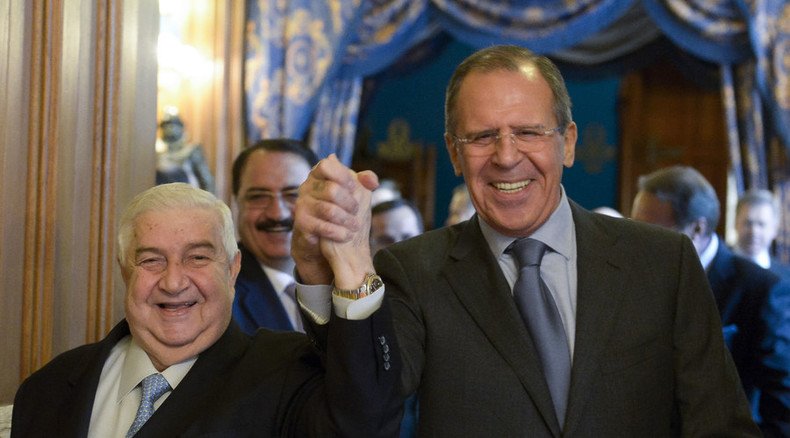Battle of Aleppo is a must-win for Russia

Once again, whatever hangs in the future for Syria on both the political and military fronts depends on the new Battle of Aleppo. The city and its outskirts, with the influx of internal refugees, may be harboring up to three million people by now.
It’s always about Aleppo.
Here’s what’s going on, essentially, on the ground. West Aleppo is controlled by Damascus, via the Syrian Arab Army (SAA).
Some of the northern parts are controlled by the Kurds from the PYD – which are way more engaged in fighting ISIS/ISIL/Daesh than Damascus. The PYD also happens to be considered an objective ally by the Obama administration and the Pentagon, much to the disgust of Turkey’s ‘Sultan’ Erdogan.
READ MORE: RT crew comes under mortar fire near Damascus
East Aleppo is the key. It is controlled by the so-called Army of Conquest, which includes Jabhat al-Nusra, a.k.a. Al-Qaeda in Syria, and the Salafi outfit Ahrar al-Sham. Other eastern parts are controlled by the “remnants” (copyright Donald Rumsfeld) of the Free Syrian Army (FSA), who refused to collaborate with the Army of Conquest.
Across the Beltway, all of the above are somewhat considered “moderate rebels.”
The most important recent development in the Aleppo battlefield is that the SAA – with key Russian help – has killed Jabhat al-Nusra leader Abu Suleiman al-Masri, a.k.a. Mahmud Maghwari, an Egyptian who’s been on Cairo’s kill list for ages.
Additionally, several hundred Iraqi Shi’ite fighters, under the supervision of superstar Iranian Quds Force commander Qasem Soleimani, have been transferred from Latakia to Aleppo.
And a roughly 3,000-strong, battle-hardened, armored Hezbollah brigade is also coming.
What is shaping up is a kind of southern offensive. These forces will all be converging not only towards Aleppo but, in a second stage, will have to clear the terrain all the way to the Turkish-Syrian border, which is now a de facto Russian-controlled no-fly zone.
The supreme target is to cut off the supply lines for every Salafi or Salafi-jihadi player – from “moderate rebels” to ISIS/ISIL/Daesh. That’s the meaning of Moscow’s insistence on the fight against all brands of terror, with no distinction. It does not matter that ISIS/ISIL/Daesh is not the main player in and around Aleppo.
For all practical purposes the whole Syria campaign is now under Russian operational, tactical and strategic management – of course with key Iranian strategic input.
Assad to Putin at Moscow talks: Terrorists would seize larger areas if Russia did not act https://t.co/moG68qVz6Lpic.twitter.com/1ZVCNCVZli
— RT (@RT_com) October 22, 2015The Russia-Syria-Iran-Iraq-Hezbollah coalition in Syria – also linked with the “4+1” intel center in Baghdad – stands a great chance of winning the next Battle of Aleppo if they fulfill three conditions.
1) Russian air cover coordinating with on the ground intel for all operations (that’s a given); 2) Popular support (that’s also a given; the Sunni urban population in Aleppo, mostly businessmen, support Damascus); 3) Experienced ground troops numbering at least 15,000 (on the way, considering the input from Iraq and Hezbollah).
In the dark
Predictably, there’s another coalition which is not exactly pleased with the way the battlefield is shaping up.
Aleppo’s main power station, 25 kilometers east of the city, for the moment is controlled by ISIS/ISIL/Daesh. Demented as it may seem – still, the whole Syria tragedy is demented - there is an informal agreement between Damascus and the fake “Caliphate”; the goons get 60 percent of the electricity, and the government gets 40 percent. After all, everyone, even beheaders, soft or otherwise, needs energy.
So how did the ‘Coalition of Dodgy Opportunists’ – which includes Turkey, Saudi Arabia and Qatar alongside the US - help in the fight against ISIS/ISIL/Daesh? Well, they bombed the Aleppo power plant a little over a week ago. This means bombing Syria’s civilian infrastructure – a blatantly 2003 shock and awe-style crime - whose victims are mostly the “Syrian people” so cherished by ‘Exceptionalistan’.
What happens in the battlefield in and around Aleppo in the next few weeks will be essential to define the diplomatic front. As it stands, Bashar al-Assad’s got the message from Moscow. He’s ready to discuss amendments to the Constitution and is prepared to hold parliamentary and presidential elections. But first the “4+1” need a major fact on the battlefield.
Russia may resume $1.6bn oil and gas projects in Syria http://t.co/23t1K7qW4Tpic.twitter.com/M7qsKAiwuG
— RT (@RT_com) July 27, 2015Even US Secretary of State John Kerry, after he talked to Russian Foreign Minister Sergey Lavrov, has changed his tune; any political solution implies direct involvement from Damascus as well as the “patriotic opposition.”
FSA “patriots” though still haven’t got the message. Lavrov explicitly committed Moscow to help them – even after they had been weaponized via Turkey and Jordan to fight Damascus - as long as they would be fighting ISIS/ISIL/Daesh. Predictably, those FSA “moderate rebels/patriots” spurned Lavrov’s offer.
Other diplomatic absurdity is the absence of Iran at the negotiating table – because of House of Saud acute paranoia. Iranian generals and advisers are a key component of ground operations, analyzing the ground intel, and the whole strategic framework in Syria.
Instead, Washington and Riyadh still insist on increasing support for those invisible “moderate rebels” – after Kerry met with King Salman in Riyadh. The State Department, for once addicted to suspense, did not specify what “support” means. It goes without saying it means more CIA training and more TOW anti-tank missiles, which will hardly be directed against ISIS/ISIL/Daesh.
The diplomatic ballet is bound to continue later this week. Just in time as the crucial Battle of Aleppo picks up.
The statements, views and opinions expressed in this column are solely those of the author and do not necessarily represent those of RT.













